Key takeaways:
- Border security must balance safety with respect for individual rights, emphasizing the importance of maintaining humanity in enforcement practices.
- Privacy is critical for building trust between the public and security agencies, as invasive measures can lead to distrust and hinder cooperation.
- Effective border security strategies include advanced technology, inter-agency collaboration, and community engagement to enhance safety while respecting privacy.
- Transparency and ongoing dialogue about security policies are vital for fostering mutual understanding and addressing community concerns regarding privacy and safety.
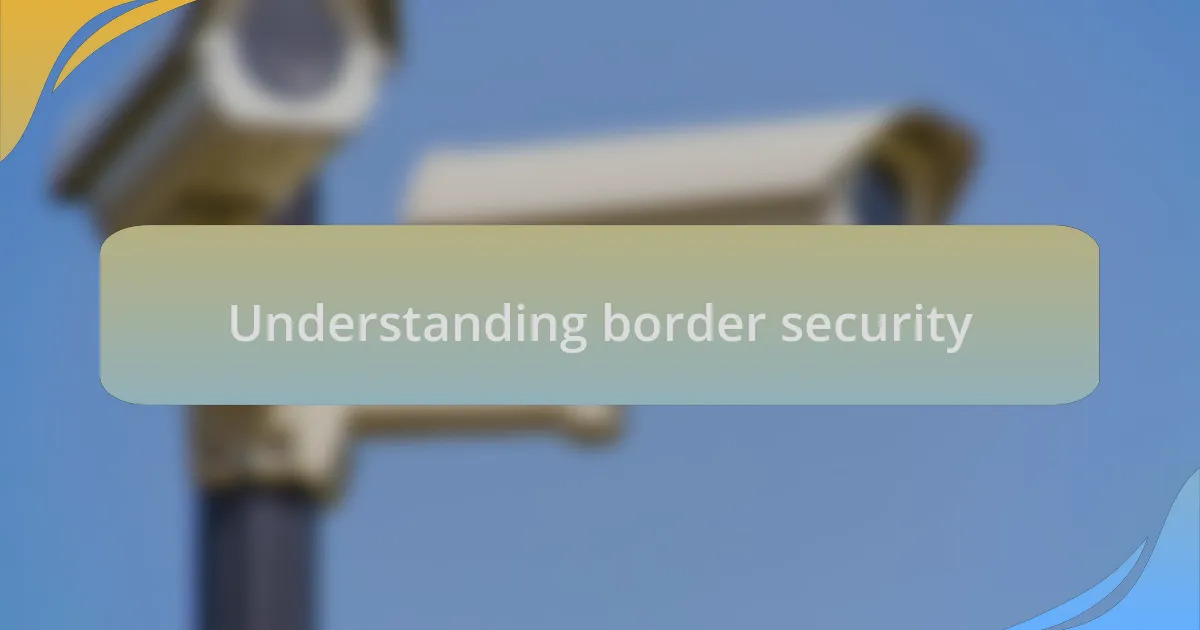
Understanding border security
Border security is a multifaceted issue that goes beyond simply monitoring who enters or exits a country. From my perspective, it’s about creating a safe environment while respecting the rights of individuals. Have you ever thought about how each border crossing represents a unique story, both of those seeking new opportunities and those charged with keeping the peace?
In my experience, I’ve seen firsthand how the dynamics at the border can evoke a range of emotions. Border agents often grapple with the responsibility of enforcing regulations while recognizing the personal hardships of migrants. It raises a significant question: how can we maintain security without losing sight of humanity?
The technology and policies that shape border security constantly evolve, making it crucial to stay informed. I remember when enhanced surveillance methods were first introduced; the conversation around privacy surged. This balance is intriguing—how can we effectively utilize technology to secure our borders without infringing on the rights of individuals? The answers aren’t straightforward, but they are crucial nonetheless.
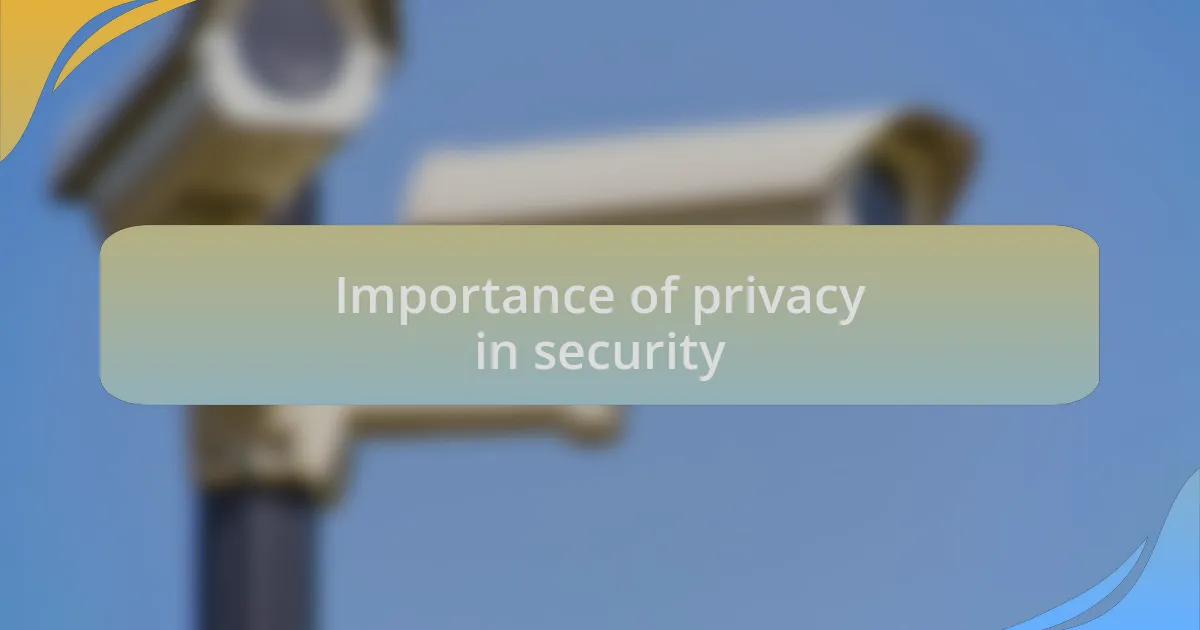
Importance of privacy in security
Whenever I think of privacy in the context of security, I remember the conversations I’ve had with friends who work in law enforcement. They often express the challenge of feeling like they’re walking a tightrope—protecting society while also respecting the personal lives of individuals. It begs the question: how can we implement strong security measures without compromising the very freedoms that make us who we are?
I’ve witnessed how invasive security measures can lead to distrust. A family member once had a negative experience at an airport where their privacy felt violated during a routine security check. This left a lasting impression, highlighting how crucial it is for security processes to maintain dignity and respect for individual privacy. After all, when people feel their personal space is breeched, they are less likely to cooperate, which can ultimately hinder security efforts.
The importance of privacy isn’t just about individual rights; it also plays a critical role in building trust between the public and security agencies. Trust fosters collaboration—people are more likely to share vital information if they feel their privacy is valued. In my experience, I’ve found that effective communication and transparency in security practices can go a long way in ensuring public cooperation, making it evident that protecting privacy is not just a legal obligation but a moral one as well.
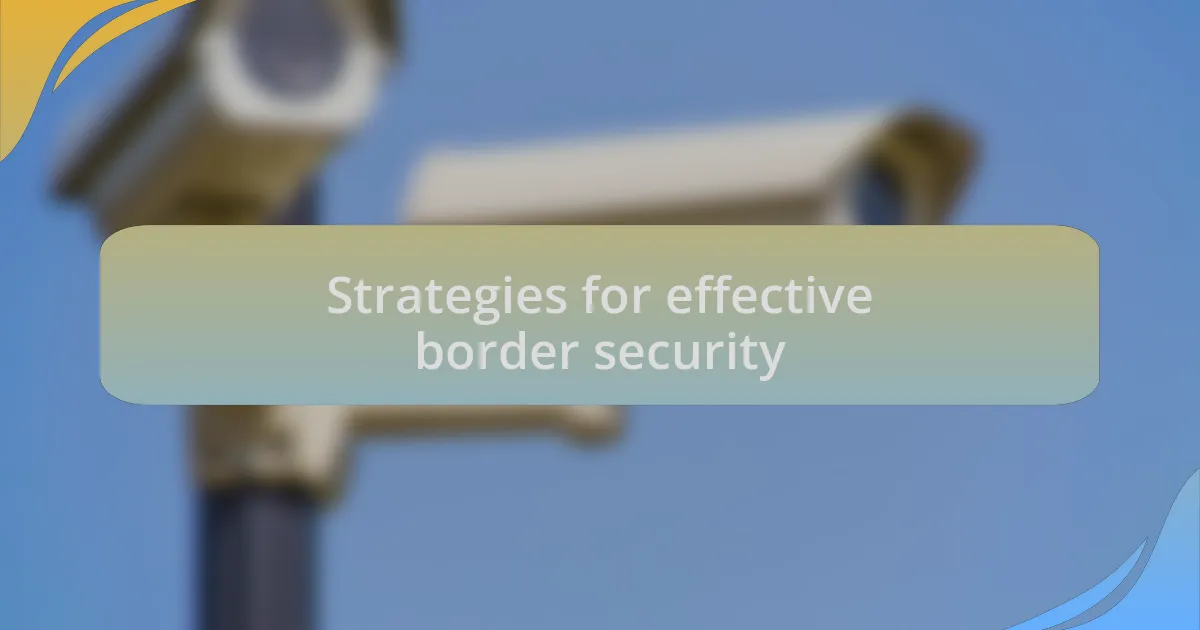
Strategies for effective border security
Effective border security relies heavily on a multi-faceted approach. One strategy that I’ve seen work well involves the integration of advanced technology, such as biometric recognition systems, which help to streamline the process while ensuring accuracy. It’s fascinating how these innovations can enhance security without requiring invasive personal searches, making crossings smoother for travelers.
Collaboration between agencies is another crucial aspect. In my interactions with law enforcement and border control officers, I’ve noticed that when they coordinate with each other and share intelligence, they can identify potential threats more effectively. This is not just about a single agency’s reach but an interconnected web of information that enhances overall safety. Isn’t it remarkable how sharing resources can lead to a stronger defense against potential risks?
Additionally, I believe community engagement plays a vital role in border security strategies. When residents in border areas feel empowered to report suspicious activities, they often become the first line of defense. I’ve had conversations with locals who took pride in being active participants in their community’s safety efforts. This not only builds trust but also fosters a sense of ownership in maintaining security that ultimately bridges the gap between citizens and law enforcement.
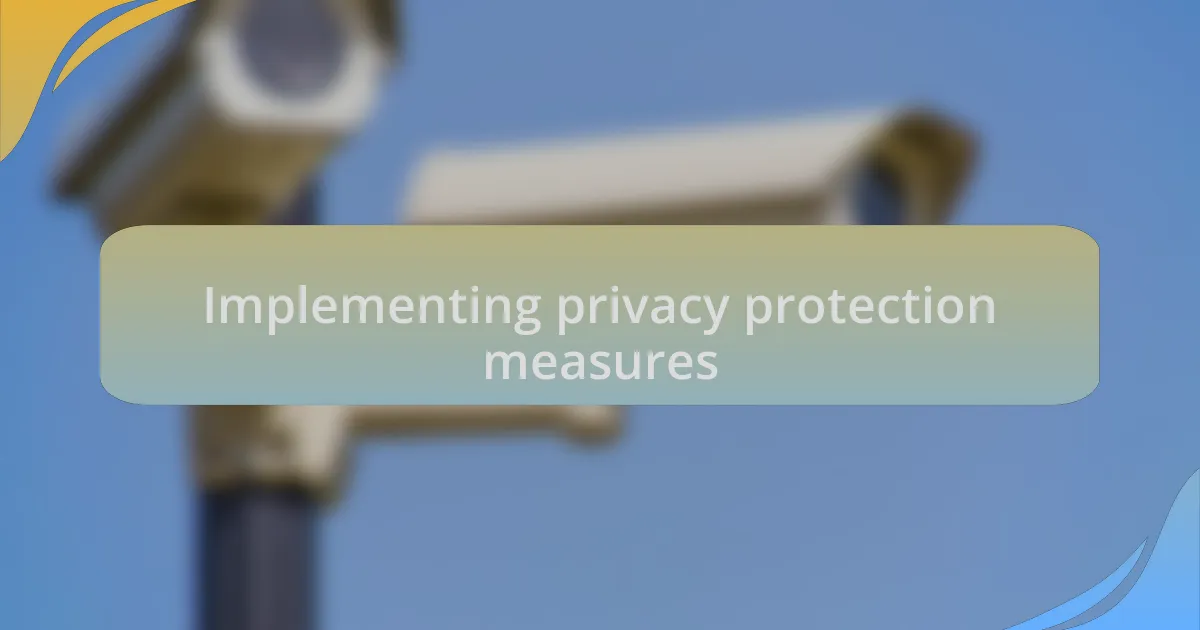
Implementing privacy protection measures
Implementing privacy protection measures is essential in the current landscape of heightened security. For instance, I recall attending a workshop where privacy experts discussed the importance of data anonymization. This technique effectively safeguards individual identities while still allowing agencies to analyze trends and patterns. I often wonder if more people would feel comfortable sharing information if they knew their identities remained protected.
Another key approach involves transparent data governance practices. When organizations establish clear protocols about how they collect and use personal data, it fosters trust among users. I remember an experience where a local governmental body sought feedback before implementing new surveillance technology. That openness not only calmed community fears but also encouraged residents to voice their concerns, leading to solutions that prioritized both security and privacy.
Additionally, incorporating user-friendly privacy tools can empower individuals to take control of their personal information. I’ve been impressed by platforms that allow users to customize their privacy settings easily. It’s fascinating how a little user agency can change perceptions about security measures. We should ask ourselves: how much more willing would communities be to cooperate if they knew their privacy was respected and protected?
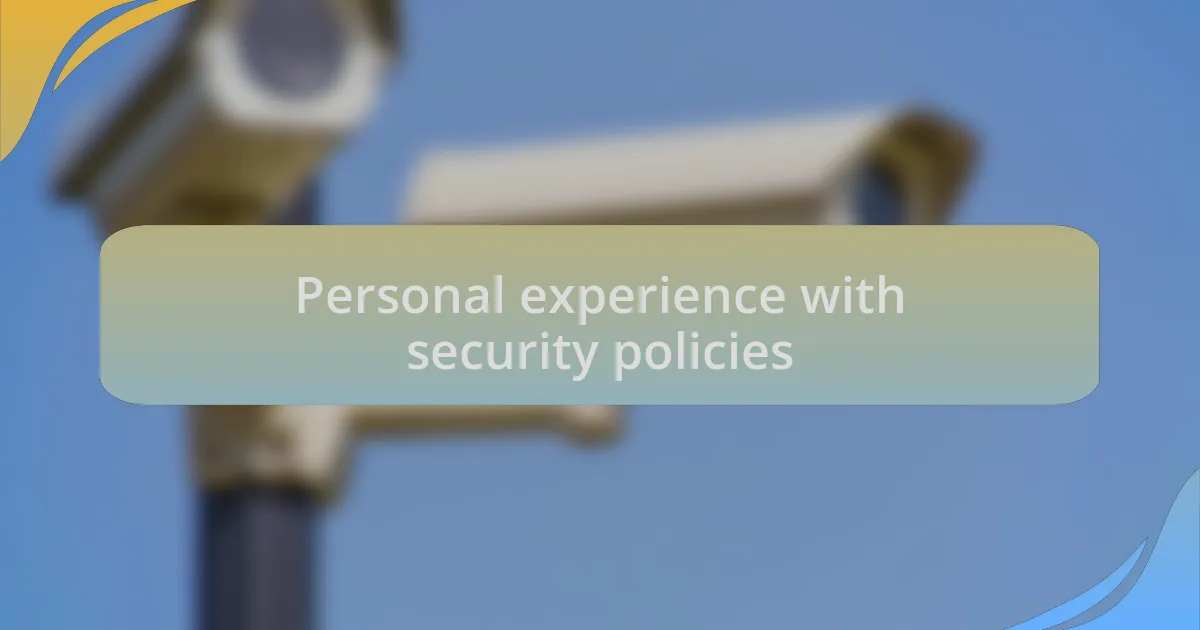
Personal experience with security policies
Navigating security policies can often feel like a tightrope walk. I once served on a community board discussing a new set of surveillance measures. The tension in the room was palpable; some members were staunch supporters citing safety concerns, while others expressed deep unease about privacy implications. I couldn’t help but reflect on how our decisions could directly impact someone’s sense of autonomy.
During that same period, I encountered a situation where my own data was almost mishandled by a security firm. I had enrolled in a program that promised enhanced safety features but required extensive personal information. After reading the fine print, I realized the level of access they sought was excessive. It made me question: are we correctly balancing the scales between security and our personal freedoms?
One takeaway from my experiences is the sheer importance of ongoing dialogue about security policies. I remember engaging with a local activist who passionately advocated for transparency in how data is used. Her dedication resonated with me, prompting me to think about how our communities thrive when there’s mutual understanding and respect for privacy. How can we foster more conversations like this to ensure everyone’s voice is heard in the policy-making process?

Lessons learned from balancing interests
In my journey of navigating security policies, I learned that genuine empathy is crucial. I once attended a town hall meeting where a single mother voiced her struggle with intrusive security measures that she felt compromised her family’s privacy. Watching her articulate her fears made me realize that, behind every policy, there are real lives affected by decisions that sometimes overlook the human element. Isn’t it vital that we consider these personal stories when shaping policies?
Another significant lesson I gleaned from balancing interests is the value of compromise. During a collaborative session with stakeholders, we identified ways to enhance community safety without sacrificing individual rights. This experience reinforced my belief that finding common ground often requires creativity and open-mindedness. How often do we rush to conclusions instead of exploring alternative solutions that respect all viewpoints?
The importance of transparency also became crystal clear through my experiences. I recall a public forum where law enforcement officials shared their data collection practices. Their openness allowed community members to ask questions and express concerns, fostering a more trusting environment. Reflecting on this, I can’t help but wonder: how can we encourage more organizations to adopt similar practices, ensuring that balance isn’t just an ideal but a lived reality?